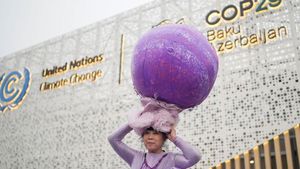At the heart of the COP29 climate negotiations currently underway in Baku, Azerbaijan, the focus has shifted toward addressing the pressing issue of climate change damages and how wealthier nations will compensate lower-income countries for losses incurred due to environmental disasters. This discussion is especially poignant following the devastating impact of Cyclone Freddy in March 2023, which left over 1,000 people dead and displaced hundreds of thousands more across southern Africa. The cyclone, which was the longest-lasting tropical cyclone on record, highlighted how vulnerable communities, particularly in Malawi, are bearing the brunt of climate change, having contributed little to the problem.
For many like Christopher Bingala, the aftermath of Cyclone Freddy was harrowing. The flooding destroyed his home and swept away his livestock, leaving him and his six children stranded without resources. "We got to a point where we would eat meat from animals affected by the cyclone because we lacked food," Bingala lamented, showcasing the desperate measures families are forced to take.
Fortunately, Bingala was able to receive around $750 from Scotland's newly established loss and damage fund, aimed at providing financial relief to individuals affected by climate-related disasters. This funding allowed his family to rebuild their lives away from flood-prone areas. He now resides in safer conditions, where he can focus on getting his children back to school and even regaining some livestock. "They are happier here because they’re not facing the water challenges we previously had," he explained.
The loss and damage fund, created by wealthier nations at last year's climate summit, earmarked around $720 million for compensation. Yet, this amount is markedly insufficient as climate-related disasters increase in severity. Nearly half of all greenhouse gas emissions since the Industrial Revolution have originated from just a few developed nations, predominantly the U.S. and Europe. This disparity has stirred international calls for more accountability and financial support from these wealthier nations, especially as developing countries face ever-growing natural disasters.
Government officials and environmental advocates are grappling with the larger financial commitments tied to climate damages. At COP29, negotiators are striving for clarity on the contributions of developed nations to loss and damage funding. Some lawmakers stress the need for specific and actionable financial pledges. "We are negotiating on nothing," said Colombia’s environment minister, Susana Mohamed, highlighting the frustrations around vague commitments. There is widespread disappointment among small island nations and other vulnerable communities, which are pushing for more substantial financial backing and actionable steps toward climate justice.
To tackle the mounting challenges, experts are proposing mechanisms like the Climate Damages Tax (CDT), which could potentially generate billions for climate action. A recent analysis by Greenpeace found substantial funding could be obtained by imposing taxes on the profits of oil and gas companies, urging high-income nations and industries to pick up the tab for the climate crisis they helped fuel. The proposed windfall would not only maintain the loss and damage fund but also provide much-needed resources for the world's most affected communities.
Negotiators at COP29 are also addressing the transition away from fossil fuels, which has become increasingly urgent. Recognition of the long-term impacts of climate change on low-income countries is central to discussions surrounding compensation. Yolande Wright from the nonprofit GiveDirectly stated, "Low-income households have contributed the least to the climate problem and now experience the worst effects."
Active participation and commitment to climate finance from developed nations are viewed as not merely considerate, but as absolutely necessary for effective climate justice. This sentiment is echoed by Philip Davis, the Prime Minister of The Bahamas, who highlighted the urgency for nations to accept responsibility for the crisis they have significantly contributed to and to start contributing adequately to alleviate the suffering of those on the frontlines.
The stakes are high, and small island nations, already seeing devastating effects from rising sea levels and severe hurricanes, are well aware of the existential threat they face. The question remains whether nations will find common ground and whether the wealthiest countries will meet their commitments to support those bearing the heaviest burden of climate impact.



